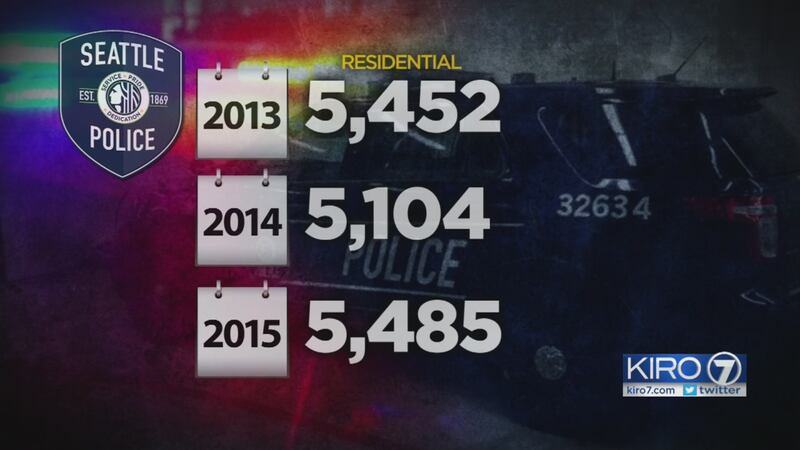A KIRO 7 investigation has uncovered that Seattle police are solving residential burglaries at a much lower rate than other police departments across the country.
Data requested by KIRO 7 shows that last year, Seattle police solved just 6.6 percent of all residential burglaries in Seattle, which totaled 5,485 in 2015.
When it comes to similar-sized cities such as Charlotte, North Carolina and Denver, Seattle is behind.
At KIRO 7’s request, Charlotte-Mecklenburg police released data showing it solved 12 percent of 4,983 residential burglaries last year; Denver police solved 15 percent of 3,498.
All three were on the Forbes list of fastest-growing cities in 2015, with Seattle ranked No. 5, Denver at No. 6 and Charlotte at No. 9.
Statistics like these illustrate why Seattle resident Diane Buckley felt she had to solve her own burglary case.
“My case was marked inactive,” Buckley said. “I never would have gotten any of my jewelry back unless I had gone and done what I did.”
It was April 2015 when a burglar broke into Buckley’s Seattle home and stole her safe. It had about 40 pieces of jewelry in it, including sentimental items such as anniversary gifts from her late husband and his wedding band.
“Oh my God, every sentimental item -- and valuable item -- I had ... everything was in that safe,” she said. “I was really devastated.”
%
%
But Buckley didn't want to be a victim; she wanted to get back her jewelry.
Buckley said police that arrived that night were kind, but they told her to call them back if she could figure out how the burglar accessed the home. She did the next morning, and an officer took fingerprints around her window to see if any might help the case.
Officers also told her to provide a list of her jewelry.
“I was told that list would be put with my file and that they would check this against the pawn shop database to see if they could locate any of my jewelry,” she said.
%
%
But after dropping off that list at the police station, Buckley checked on her case online and found it was marked inactive.
“That's probably what spurred me to think, well, I better do some stuff myself because obviously, if your case is marked inactive, the police aren't going to follow up on it,” she said.
She even visited a pawn shop in Seattle, hoping to find her items. The employee told her that her items would most likely pop up online in a few weeks, perhaps outside of the city.
“My first clues came from the pawn shop guy,” she said. “Very helpful.”
Buckley began checking Craigslist and Ebay, and sure enough, three weeks later, she spotted some of her items posted on Ebay from a pawn shop in Portland.
She contacted both Portland and Seattle police. Buckley said the SPD asked her to provide her list of items again.
“Should a citizen have to do this kind of legwork to get their stolen items back?”
KIRO 7 asked Assistant Chief Robert Merner, who commands the Criminal Investigations Bureau.
“Quite frankly, no. At no time should the responding officers or investigators say, if you figure out how they got in, let us know. That’s their job as investigators,” Merner said.
“If all of this is what happened, she deserved much better service from the Seattle police and that shouldn’t happen,” he added.
But Merner said there is a new focus on property crimes like burglaries and car prowls, especially in the North Precinct.
An operation linking patrol and detectives, the Major Crimes Task Force, narcotics investigators and the King County Prosecuting Attorney’s Office has been underway for over six weeks.
It's identified dozens of prolific offenders that are often responsible for dozens of cases each. Merner told KIRO 7 that as of April 13, 97 suspects were linked to 300 separate incidents and more than 100 separate charges had been filed.
Since many have drug problems, the operation is also coming down on their dealers, who often bring criminals to specific neighborhoods in the North Precinct.
The task force is headed by Capt. Eric Sano, who said when patrol officers make an arrest they now call in his specially trained detectives, with some surprising results.
“We end up interviewing the suspects and having them take us around to other locations that they may have burglarized,” Sano said. “Most of them have a drug problem and they say, ‘Look, I have a serious drug problem.’ They’re not bad people and some of them do have a conscience. They say, 'Look, I’ll tell you where else I’ve burglarized.'”
Sano said two of his detectives will stay working in the North End, even after the operation is over.
As for Buckley, she drove down to Portland herself and bought back her remaining jewelry. It was about a quarter of what was originally taken. Her husband’s cufflinks were his only pieces of jewelry left.
Buckley is glad she got back anything at all.
“Stubborn works for you sometimes,” Buckley said. “Tenacity. Follow through.”
Cox Media Group








